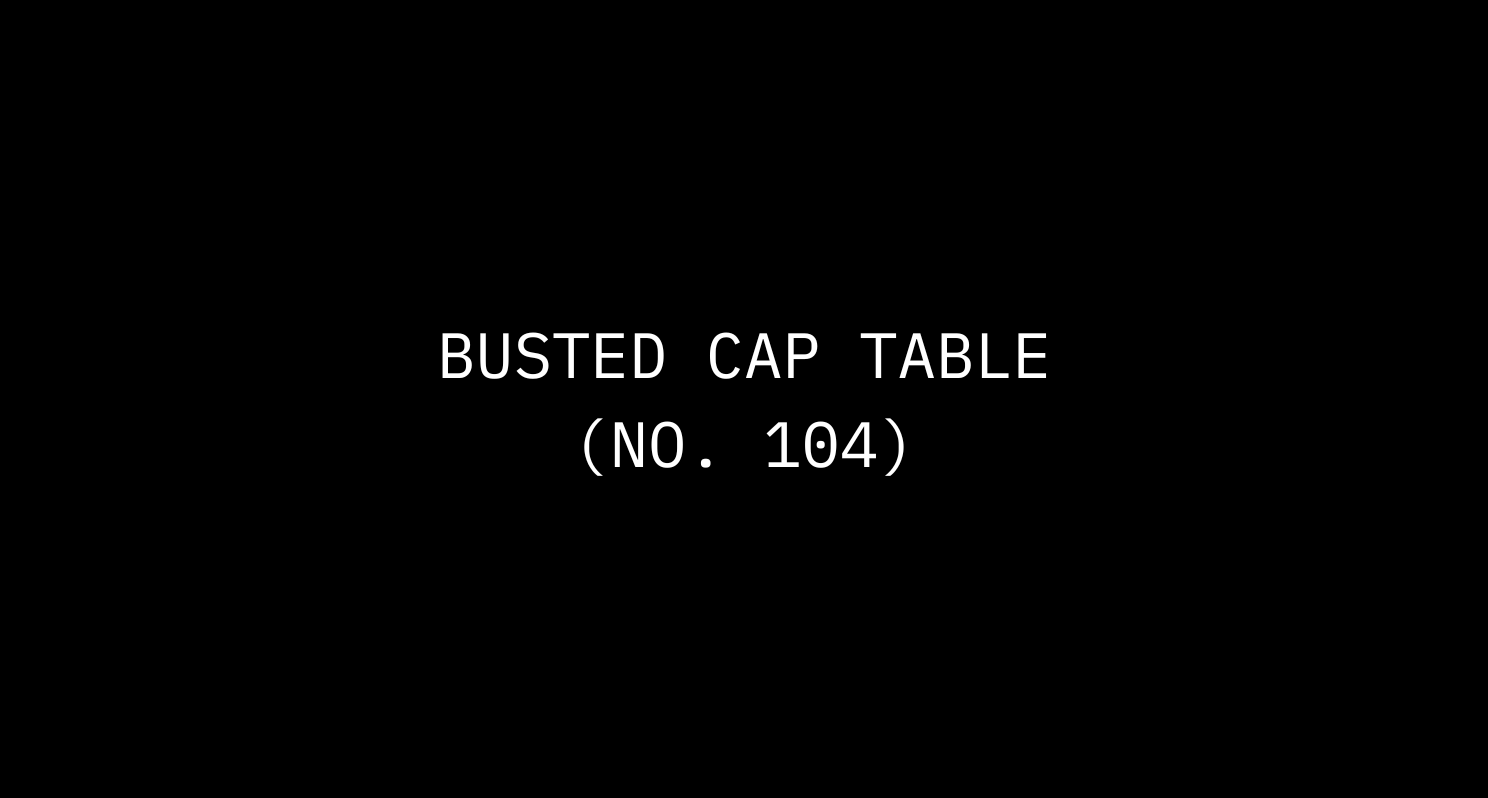The BSList - Busted Cap Table (No. 104)
Recently got the following question:
“I’m getting inbound from investors and have a screwed up cap table because of my venture studio relationship… I don’t really know what I should and shouldn’t say but I feel like when I mention how much I own, but when anyone shows real interest we get to a point where I can tell they are turned off by the cap table that I haven’t had any control over.”
Before we get into a debate about how much a founder should own, there’s a context implicit in the question that is easily overlooked. Did you spot it?
It’s this part:
“I’m getting inbound from investors…”
Nearly all of the inbound VC interest happening out there is from non-partner investors (i.e. professionals who can’t write a check) and they’re doing it systematically. In other words, you’re one of dozens, perhaps 100’s of companies getting the same exact e-mail where the VC says they’re really excited about what you’re doing and they work with such and such partner and the firm has done such and such IPOs, etc.
All they’re doing is filling a database.
They’re not excited about what you specifically are doing. Do you know how I know? Because you’ve still only got a handful of people on your team and you’re doing nine jobs—none of which involves creating enough reputation and industry notoriety to get on the radar of an investor quite yet. The only thing you did was get listed on Crunchbase or Pitchbook or some other database and you’ve just met an analyst who is screening for all the infosec companies that have raised less than $5mm.
What does real excitement look like?
A check-writing partner reaches out to you.
They tell you specifically why you’re what they’re looking for.
They reach out multiple times or through multiple different channels or people.
They pitch you their firm and talk very specifically about what kind of deal they should do with you at what dollar amount and at what price.
There’s a term sheet.
Everything else falls under the category of “interested” which is an insincere way of saying, “We haven’t passed on you yet.” (And then, even when they have, they still remain “interested” should Sequoia decide to throw down a term sheet.)
Now that we’ve established that, let’s talk about founder blind spots.
It is completely natural to assume that the other person loses interest in the one thing you can’t control. You’d literally have to be the lowest ego, most self-aware person in the entire world to think, “You know, objectively, I’ll bet my growth isn’t really in the top 5% of companies that this partner at a highly visible firm is seeing. I’ll bet that’s why they’ve lost interest.”
I also think the language of VC is highly confusing.
Investors say things like, “We’d be interested in writing a $500k check.”
Weirdly, what they really mean is, “If we were interested, we’d be interested in writing a $500k check.”
But didn’t they say they were “interested?”
Yes, but they didn’t say they were interested in writing a $500k check.
Oh, they did?
Yeah, they meant they were interested in determining whether or not they’d be interested in writing a $500k check.
And they could do that within two weeks.
Write the check?
No, they could see if they were interested in being interested in writing the check. The check isn’t actually coming in two weeks.
So it’s not surprising when most founders, especially the guys, assume it’s something else—and not that they just haven’t wow’d the other person. Because they were “interested” up until that point!
That doesn’t make you a bad founder.
That doesn’t make the company bad.
Think of it this way. I just broke an hour and a half for a half marathon this year for the first time ever. At 43, I’m pretty darn proud of that and you might think that’s pretty fast—but if I equate that into startup terms, no one would fund me at that pace. That put me at around the top 4.7% of people in that race. At Brooklyn Bridge Ventures, I would fund, at most, 10 out of about 2000 deals I’d see in a year.
That’s 0.5%.
So being faster than 95% of the other people racing still wouldn’t be nearly fast enough if the prize for the top 0.5% was a term sheet.
But back to the cap table.
Here’s why VC’s don’t actually care about your prior cap table in most circumstances.
The most honest reason is that we’re selfish. We want what we want and if we really want it, we don’t really care about what else is going on with the cap table. That’s why down rounds exist. If we really want to be in a deal and we think the cap table is a mess, we’ll just impose our will on it. If you don’t like it, you can take someone else’s deal, but if I’m the only deal, you’re taking it when the other option is to let the company die.
We want our 10, or 15, or 20% and if we have to squish anyone along the way to get it, them’s the breaks. We’ll do that if we’re really interested.
And as for the founder incentive thing, I have two comments.
One, if the biggest reason why you’re starting this company is for the big payout at the end, you’re either not the right founder for this company or you’re not the smartest CEO this company could have. The highest statistical likelihood for any startup is that no one gets a payout—because hard things are hard. You should be working on it because you’re obsessed with the problem and there was just no way you could go on in your career without giving it a shot.
To quote Shoeless Joe in Field of Dreams, “I'd have played for food money.”
Second, if a company’s board ever decided it needed a new CEO, what percent of the company do you think that person is getting? Surely it’s less than what you have and less than what you’ll still have after a few more rounds. Does anyone ever question that person’s incentive because of their low ownership?
Not to mention that it’s all fixable.
If a VC thought that you were the right founder and this was the right company, they’d deliver you a term sheet after looking at your current one with something that translates into the end result they’re looking for.
“Here’s the pre-money that I need to get my ownership target. Here’s the option pool that I think fairly incentivizes you. Sure it squishes down everyone else. If they don’t like it, they can give you a better term sheet.”
Which actually reinforces the whole non-check writer thing. An analyst or associate will never propose such a deal. They don’t have the deal experience to know how to properly do that, nor have they been through enough cycles where they’ve seen that work in companies that ultimately wound up with a decent outcome despite some ups and downs.
So, yes, the person you’re talking to might lose interest, but the person you’re talking to is too inexperienced to lead your deal in the first place—so you’re not actually losing anything.
The other comment that was made as part of the question was about startup studios—entities that get someone from zero to launch or some other stage where you’re ready to raise. Sometimes they come up with the idea or help you with the team, etc., and they take a hefty chunk of the cap table to do it. Chances are, you’re not the first company to come out of that studio to get funded, but even if you were, lots and lots of startup studios have had big chunks of cap tables where the founding CEO basically gets “hired”, and the companies that actually outperform have been funded without issue. Some have become multi-billion dollar exits where, no matter who owned what, everyone makes a ton of money.
There is, however, one exception to all this—and that’s when the deal is so egregious that it signals that this founder is a poor negotiator. Like, if you gave away 99% of the company to the person who came up with the name or who sold you the domain, a VC is going to assume that this is the first in a string of seriously bad decisions.
That’s not the case if you sold off 30-35% of the company in a round during a difficult point in the cycle, or as a first-time founder with no other options.
That’s just what you’re doing to move forward—and no one gets dinged for that.
You got dinged for not moving forward fast enough—or maybe you didn’t even get dinged at all, because you didn’t pitch your pitch. You were back on your heels, answering some analyst’s pings on out of context growth numbers, without getting a real chance to share your vision, craft a narrative and explain why this is the most important thing you can be working on and how you’re going to make a huge dent in the way the industry works, while returning their whole fund.




